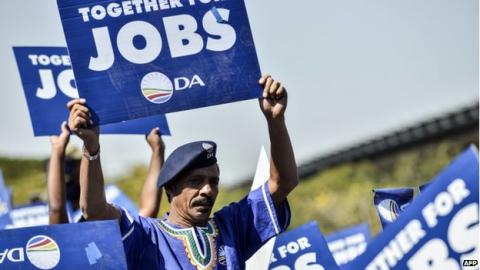
Slow economic growth of 1.4 percent has resulted in an increasing trade deficit gap of over 4 percent, which has been viewed by analysts as reason to believe it will take some time for South Africa to emerge from this slump.
The state of affairs in South Africa could be described as tense for everybody even before The Moody’s credit rating agency downgraded the nation’s credit rating earlier today to Baa2- just two steps away from junk status.

According to a BBC report on Moody’s decision, the move is in line with similar action from other major credit agencies like Standard & Poor’s and Fitch, both of which have already downgraded South Africa’s credit rating this year.
In response, the South African government has stated that it was addressing the economic issues, which led to Moody’s downgrade decision.
“Government is committed to narrowing the budget deficit, stabilising debt and rebuilding the fiscal space that enabled South Africa to escape the worst effects of the global economic crisis." a statement from South Africa’s Treasure said.
Disturbances In A Sluggish Economy
The credit downgrade impacts on the South African currency marks a culmination of factors that have complicated the government’s efforts to restore a better measure of economic confidence for South Africa, which has enjoyed wide recognition as Africa’s most stable economy.
Slow economic growth of 1.4 percent has resulted in an increasing trade deficit gap of over 4 percent, which has been viewed by analysts as reason to believe it will take some time for South Africa to emerge from this slump.
The seemingly perennial issue of high unemployment rates has been worsened by a number of labor strikes and action affecting key mineral exports, especially platinum.
Also, allegations of high-level corruption and mismanagement of public funds including overspending by President Jacob’s deputies in upgrading his private residence have dogged South Africa’s government, making the already difficult task of infusing confidence into government stewardship, more difficult.
Looming Electric Power Cuts
The electricity issue is a constant reminder of the precarious footing of the South African economy, as it emerged yesterday that the South African government was hundreds of millions of dollars behind in payments to the largest public utility corporation, Eskom.
Yesterday, Eskom had threatened to cut all power to South African cities within 2 days, if the government did not pay its arrears in full, but new reports suggest it is in talks with the government to avert the shutdown.
Even before Eskom’s recent threat, for years millions of South Africa’s residents have been experiencing ‘load shedding’ - a system of forcing blackouts in one area to allow for electricity coverage in another- as the nation has not funded the construction of more power stations to feed growing electric consumption demands.
President Jacob Zuma’s of the ruling African National Congress (ANC) was recently voted in for a second term in presidential elections but, the ANC’s once unquestioned position as the head of South Africa’s politics is increasingly coming under attack by citizens who expect more from their government.